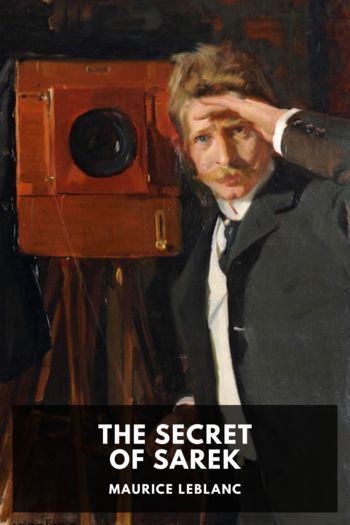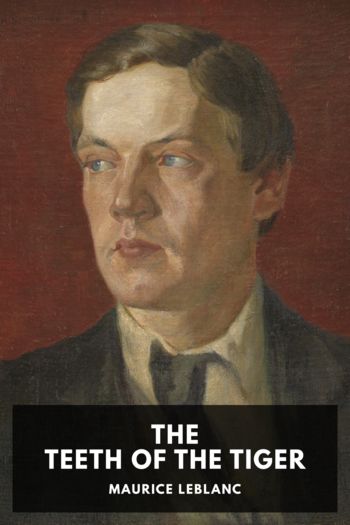The Secret of Sarek - Maurice Leblanc (easy to read books for adults list TXT) 📗

- Author: Maurice Leblanc
Book online «The Secret of Sarek - Maurice Leblanc (easy to read books for adults list TXT) 📗». Author Maurice Leblanc
She saw a boat put off from the steamer and supposed that they were going to land and explore the village. But not only did she dread an enquiry in which her son might be involved: she herself did not wish to be found, to be questioned, to have her name, her identity, her story discovered and to be brought back into the infernal circle from which she had escaped. She preferred to wait a week or two, to wait until chance brought within hailing-distance of the island some fishing-boat which could pick her up.
But no one came to the Priory. The steamer put off; and nothing disturbed her isolation.
And so she remained for three days. Fate seemed to have reconsidered its intention of making fresh assaults upon her. She was alone and her own mistress. All’s Well, whose company had done her a world of good, disappeared.
The Priory domain occupied the whole end of the island, on the site of a Benedictine abbey, which had been abandoned in the fifteenth century and gradually fallen into ruin and decay.
The house, built in the eighteenth century by a wealthy Breton shipowner out of the materials of the old abbey and the stones of the chapel, was in no way interesting either outside or in. Véronique, for that matter, did not dare to enter any of the rooms. The memory of her father and son checked her before the closed doors.
But, on the second day, in the bright spring sunshine, she explored the park. It extended to the point of the island and, like the sward in front of the house, was studded with ruins and covered with ivy. She noticed that all the paths ran towards a steep promontory crowned with a clump of enormous oaks. When she reached the spot, she found that these oaks stood round a crescent-shaped clearing which was open to the sea.
In the centre of the clearing was a cromlech with a rather short, oval table upheld by two supports of rock, which were almost square. The spot possessed an impressive magnificence and commanded a boundless view.
“The Fairies’ Dolmen, of which Honorine spoke,” thought Véronique. “I cannot be far from the Calvary and Maguennoc’s flowers.”
She walked round the megalith. The inner surface of the two uprights bore a few illegible engraved signs. But the two outer surfaces facing the sea formed as it were two smooth slabs prepared to receive an inscription; and here she saw something that caused her to shudder with anguish. On the right, deeply encrusted, was an unskilful, primitive drawing of four crosses with four female figures writhing upon them. On the left was a column of lines of writing, whose characters, inadequately carved in the stone, had been almost obliterated by the weather, or perhaps even deliberately effaced by human hands. A few words remained, however, the very words which Véronique had read on the drawing which she found beside Maguennoc’s corpse:
“Four women crucified. … Thirty coffins. … The God-Stone which gives life or death.”
Véronique moved away, staggering. The mystery was once more before her, as everywhere in the island, and she was determined to escape from it until the moment when she could leave Sarek altogether.
She took a path which started from the clearing and led past the last oak on the right. This oak appeared to have been struck by lightning, for all that remained of it was the trunk and a few dead branches.
Farther on, she went down some stone steps, crossed a little meadow in which stood four rows of menhirs and stopped suddenly with a stifled cry, a cry of admiration and amazement, before the sight that presented itself to her eyes.
“Maguennoc’s flowers,” she whispered.
The last two menhirs of the central alley which she was following stood like the posts of a door that opened upon the most glorious spectacle, a rectangular space, fifty yards long at most, which was reached by a short descending flight of steps and bordered by two rows of menhirs all of the same height and placed at accurately measured intervals, like the columns of a temple. The nave and side-aisles of this temple were paved with wide, irregular, broken granite flagstones, which the grass, growing in the cracks, marked with patterns similar to those of the lead which frames the pieces of a stained-glass window.
In the middle was a small bed of flowers thronging around an ancient stone crucifix. But such flowers! Flowers which the wildest imagination or fancy never conceived, dream-flowers, miraculous flowers, flowers out of all proportion to ordinary flowers!
Véronique recognized all of them; and yet she stood dumbfounded at their size and splendour. There were flowers of many varieties, but few of each variety. It was like a nosegay made to contain every colour, every perfume and every beauty that flowers can possess.
And the strangest thing was that these flowers, which do not usually bloom at the same time and which open in successive months, were all growing and blossoming together! On one and the same day, these flowers, all perennial flowers whose time does not last much more than two or three weeks, were blooming and multiplying, full and heavy, vivid, sumptuous, proudly borne on their sturdy stems.
There were spiderworts, there were ranunculi, tiger-lilies, columbines, blood-red potentillas, irises of a brighter violet than a bishop’s cassock. There were larkspurs, phlox, fuchsias, monk’s-hoods, montbretias. And, above all this, to Véronique’s intense emotion, above the dazzling flowerbed, standing a little higher in a narrow border around the pedestal of the crucifix, with all their blue, white and violet clusters seeming to lift themselves so as to touch the Saviour’s very form, were veronicas!
She was faint with emotion. As she came nearer, she had read on a little label fastened to the pedestal these two words.
“Mother’s flowers.”
Véronique did not believe in miracles. She was obliged to admit that the flowers were wonderful, beyond all comparison with the flowers of our climes. But she refused





Comments (0)